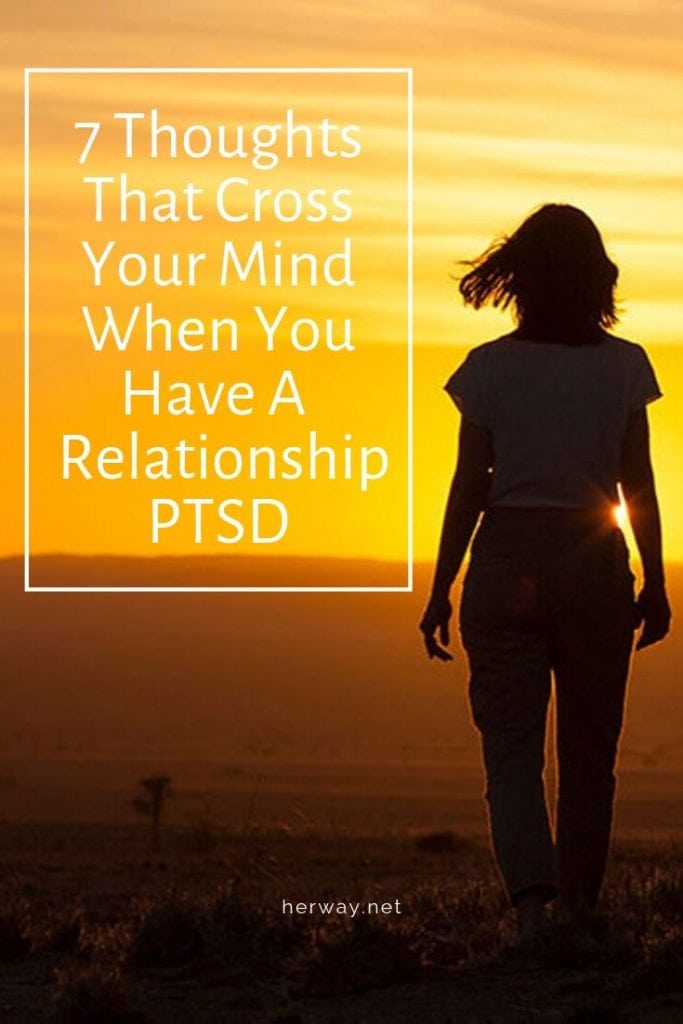7 pensamientos que se te pasan por la cabeza cuando tienes una relación TEPT
Las relaciones traumáticas pueden basarse en un trauma psicológico, verbal, físico o sexual, o pueden ser una combinación de todo lo anterior.
If you’re coming out of such a relationship, you’re probably experiencing post-traumatic relationship syndrome, where you feel like no one understands you and you feel vulnerable, hurt and unable to trust anyone.
Tu cuerpo y tu mente están doloridos y pierdes la esperanza en días mejores y en la curación.
You feel afraid of making another commitment because you’re convinced that someone will hurt you again.
Or you feel utterly helpless and you don’t see the point in trying to do anything about it or seeking help from others.
While it’s totally understandable that victims of a traumatic relationship feel that way, certain attitudes can prolong your pain and make you even more vulnerable.
Las siguientes 7 actitudes pueden mantenerte atascado en un relación traumática ¡alias limbo y por eso es de vital importancia empezar a trabajar en ellos a tiempo!
“I don’t see the point in trying…”

This one reflects the syndrome called ‘learned helplessness’.
When you don’t see the point in trying and dealing with the current situation, it means you’re being overly pessimistic, you don’t believe that things will change and you give up because you have no motivation to keep pushing forward in life.
This attitude can become ingrained (especially if you’ve experienced a few traumas in a row) but it’s really important that you fight it with all of your strength.
It’s important to find a silver lining and understand the need to push forward in life instead of giving up immediately.
“No one ever made it, so why should I try?”

When we’re trying to find an excuse for not doing something, we reflexively refer to other people who haven’t succeeded in overcoming something and not those who did.
Como los niños en la escuela.
When they get a bad grade, they instantly point to others who got a bad grade too, just to prove that it should be so and the majority didn’t succeed in getting a good grade.
Whenever this sentence ‘No one ever made it, so why should I try?’ comes to your mind, just convert it into a statement: “If I never try, I’ll never make it!”
Y tú mismo sabes la verdad que hay gente que lo ha conseguido y lo han conseguido por ser decididos, optimistas y por creer que sus esfuerzos darán fruto.
“Why me?”

This is one of the most frequent questions when we’re dealing with post-traumatic experiences.
We ask ourselves, “Why me?” when things don’t go as we would like them to.
Pero lo cierto es que nada sale en la vida como queremos y cuanto antes lo aceptemos, mejor.
En lugar de maldecir tu destino, comprende que hay otra persona (o miles de ellas) en el mundo haciéndose esa misma pregunta.
We can’t influence what will happen to us but we can influence its consequences.
Recuerda que la aceptación de nuestra realidad es la primera ¡paso a la curación!
“I will just forget that anything happened and make the best of it!”

Otra actitud peligrosa es desentenderse de los acontecimientos pasados y decidir seguir viviendo como si nada hubiera ocurrido.
Denial can cause ten times more serious consequences and that is why we should never try to suppress our emotions or something we’ve gone through.
Como ya se ha dicho, el primer paso para curarse es aceptar lo que pasó y comprenderlo en lugar de olvidarlo todo y seguir adelante como si nada hubiera pasado.
Esto es lo peor que puedes hacer por ti mismo y, si te quedas demasiado tiempo con esa actitud, lo más seguro es que te salga el tiro por la culata con tremendas consecuencias.
Véase también: Si reprimes tus emociones, deberías leer esto
“Nothing hurts me. I’m strong. I don’t cry.”

Sometimes we’re afraid to be vulnerable and we think that if we don’t show any sign of being hurt, we will win the battle.
Pero esto no es cierto en absoluto. Este tipo de actitud sólo prolongará las consecuencias del dolor y el trauma en lugar de hacerte sentir mejor.
Recuerda que forzarte a sentir ciertas emociones no es lo mismo que sentirlas de verdad en tu interior.
Pretending that you’re tough and strong will only result in wasting your time and avoiding the inevitable, which is dealing with your emotions instead of neglecting them.
“I will never open myself up to anyone again.”

It’s normal to feel scared of opening yourself up to someone new after a traumatic relationship but constantly repeating to yourself that you will never open yourself up to anyone again is not really healthy and it will bring you more harm than good.
You need to understand that if something happened to you once, twice or three times, it doesn’t mean that it will happen the fourth time as well.
No todas las relaciones están condenadas a ser tachadas de traumáticas ni todas las personas son maltratadores emocionales en potencia.
Para curarse de una relación traumática, uno de los pasos es también estar abierto a nuevas relaciones, porque si temes algo, significa que tus heridas aún necesitan tiempo para cicatrizar.
But this doesn’t mean that you should force yourself to enter a new relationship only to prove to others that you’re over your past one.
Como todo, esto debería salirte de forma natural.
“Maybe if I hadn’t done (sth.), this wouldn’t have happened to me.”

Sentirse culpable es también una de las actitudes más venenosas tras una relación traumática.
You start thinking about too many possible outcomes and your actions and by doing that, you refuse to cope with the current situation you’re in.
It’s important to understand that you can’t go back and you cannot change things and you need to understand that it’s not your fault that you’re going through this.
Everything happens for a reason and this doesn’t mean that you deserved it.
Bad things happen to us to make us stronger, not weaker, and it’s up to you to either choose to keep running in circles or choose to be a winner!







